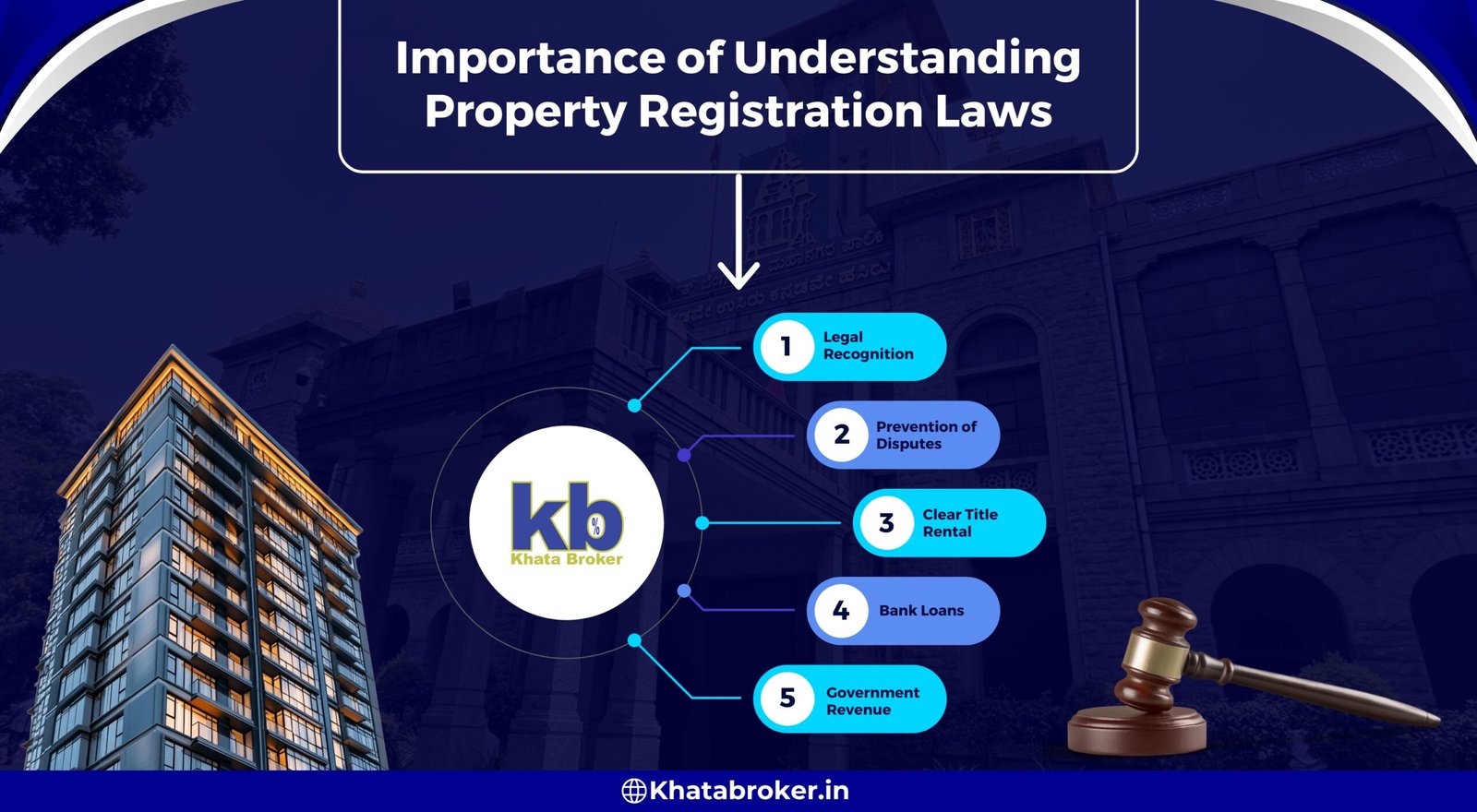Property registration is a key step in buying or selling real estate in India. When the seller registers, they transfer property ownership to the buyer. This ensures that no one will challenge the title. The law for property registration in India comes from a few key sources.These include the Registration Act of 1908, the Transfer of Property Act of 1882, and some state laws on stamp duty and registration fees. In 2025, the government made changes to simplify property registration. They aimed to prevent fraud and improve transparency.
This blog will cover the basics of property registration laws in India for 2025. You will learn how property registration works, why it is important, and key laws related to it.
Importance of Understanding Property Registration Laws

Registering property is very important for proving ownership. Some reasons why it is important include:
- Legal Recognition: Registering the property shows that the person is the true owner.
- Prevention of Disputes: Registering a transaction prevents future ownership disputes. It creates a clear record.
- Clear Title Rental: It protects the new owner from any claims or debts that were not disclosed.
- Bank Loans: When applying for a property loan, banks usually need property title registration documents.
- Government Revenue: All stamp duty and registration fees from property transactions go to government funds. These funds are used to develop public infrastructure and services.
Property transactions have no legal value without registration. This can cause problems later on.
Key Property Registration Laws in India
The registration of property in India falls within the ambit of the Registration Act of 1908. The Act mainly governs documents related to immovable properties and applies nationwide. Property registration laws specifically provide for the following considerations:
- Mandatory Registration: The Registration Act requires certain property documents to be registered. Such documents denote sale deeds, lease deeds, or gift deeds. Unregistered instruments can’t be used as evidence in court for any disputes.
- Time Frame for Registration: Register property documents within one hundred twenty days from the execution date. Failure to register a property document following the due period incurs a penalty. The registering officer may not register documents if he or she does not see good reasons for the delay.
- Stamp Duty: You must pay stamp duty to register property in India. The rates vary by state. The stamp duty rate relies on the actual value for registration. Part of the money goes to government projects.
- Registration for Property Types: All property types—residential, commercial, and agricultural—follow the same registration steps. You must register with the local sub-registrar, though procedures may vary slightly.
- Ownership and Title Transfer: Transferring ownership from one person to another follows legal rules. This is done under the Transfer of Property Act, of 1882. After registering the document, the new owner’s name goes into government records. This makes them the legal owners.
Property Registration Process in India (2025)
Here is a step-by-step explanation of how the property registration process works in India in 2025:
Step 1: Drafting the Sale Agreement
First, draft a sale agreement. Before property registration, the buyer and seller must agree on the sale terms. This includes the sale price and payment terms. They usually write this agreement in a sale deed for later registration.
Step 2: Documents to Present:
The required documents for registration generally include:
- Original sale deed
- Proof of identity and address of the buyer and seller.
- Property title documents
- Payment receipt for stamp duty.
- Proof of witnesses’ identity
Step 3: Visit the Sub-Registrar’s Office:
The next step is to visit the Sub-Registrar’s office for document submission. Both parties are to be present at the time of registration.
Step 4: Verification by the Sub-Registrar:
Verify your submitted documents with the Sub-Registrar. If everything goes well, then the Sub-Registrar is going to register the document. The Role of the Sub-Registrar is to register most documents related to property transfer. This is important because it ensures compliance with all legal requirements.
Step 5: Signing the Document:
The buyer and seller must sign the property deed in front of the Sub-Registrar. Then, the Sub-Registrar will add the official stamp to register the deed.
Step 6: Receiving the Registered Document:
Finally, the purchaser will receive the registered deed, which serves as proof of ownership. This document will thereafter serve for all future legal and financial transactions.
It is a procedure generally followed by people intending to buy or transfer property in the metropolitan city of Bangalore. The Sub-Registrar’s job in property registration is to ensure documents are properly executed, registered, and legally valid.
Recent Changes in Property Registration Laws (2025)
Many different areas of commercial property registration or registration laws related to property changed in the year 2025. These changed ways of registering properties include:
- Digital Registration: To speed up processes and cut delays, many states allow online property registration. This is part of the government’s shift to e-governance. It aims to make processes faster and more transparent.
- Integration with Aadhar: In some states, the use of the Aadhar card in property transactions has now been made compulsory. This links the property record to the individual’s identity and makes it more difficult to get away with fraudulent transactions.
- Unified Stamp Duty Rates: Some states want to harmonize stamp duty rates. This will help avoid confusion and conflicting rates. The reason for such a change is to allow buyers and sellers to understand more clearly the costs involved in property registration.
- Sub-Registrar Role Enhancement: The enhancement of the Sub-Registrar role emphasizes improved efficiency in the role of the Sub-Registrar’s office through increased use of technology in the system. For example, both the buyer and the seller use biometric verification and digital signature systems to establish the credibility of their identities.
- Delayed Registration Penalties: To promote on-time registration, late registration penalties are now higher. Buyers and sellers want to complete the registration process on time.
Conclusion
The 2025 changes to the Company Registration Act mark a major shift. They aim to create a friendlier business climate in India. The government aims to boost entrepreneurship and attract investment. They do this by embracing digital tools, easing compliance rules, and enhancing transparency. Property registration laws are changing. They will be easier to use for transactions. These changes will include safety features once finished. They will involve digital registration or biometric verification.
Frequently Asked Questions
What is the difference between a sale deed and a gift deed in property registration?
Do I need a lawyer for property registration?
While not mandatory, having a lawyer to draft and verify documents can help ensure that the property registration process is smooth and free of legal issues.
What are the consequences of incorrect property registration?
Incorrect property registration can lead to disputes, loss of ownership, or problems when selling the property in the future. Always ensure the documents are accurate before registration.
Can property registration be canceled?
In some cases, property registration can be canceled if fraud, misrepresentation, or illegal activities are involved. You will need to file a case in court for cancellation.



Leave A Comment